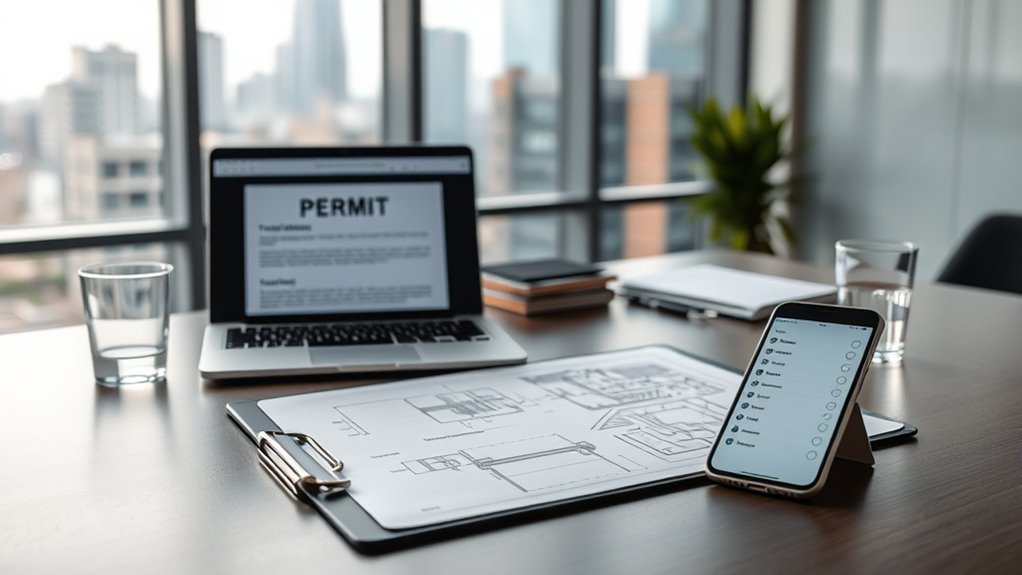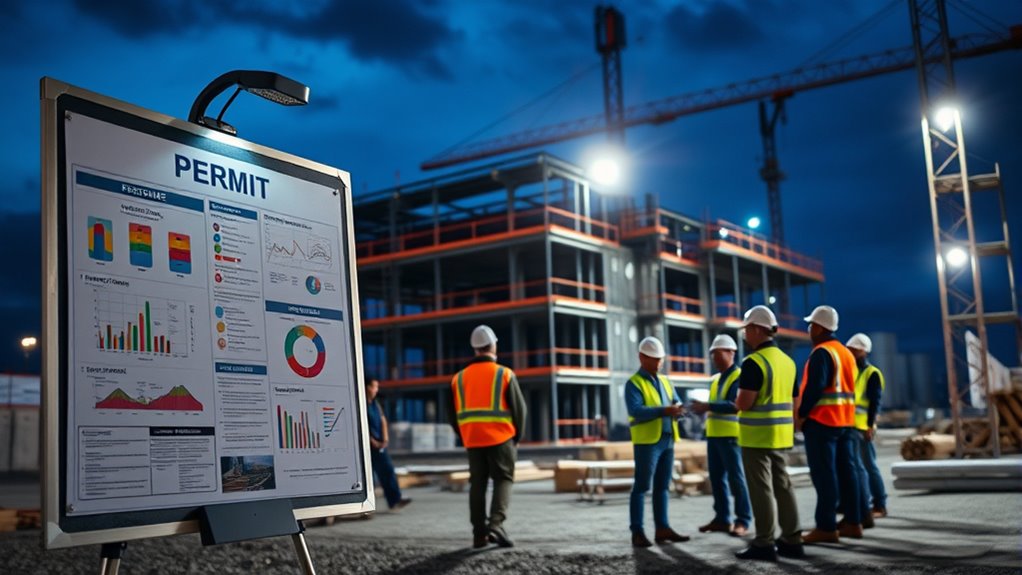Understanding permits and inspections can seem tricky, but most myths are false. You might think only major work needs permits, but even small projects often do. Inspections ensure safety and code compliance, saving you trouble later. Skipping permits could lead to fines, delays, or legal issues. Quick approvals come from knowing the process and preparing documents. Keep these facts in mind, and you’ll smoothly navigate your project—more insights await as you explore further.
Key Takeaways
- Permits are required for all projects affecting safety, structure, or zoning, regardless of size or scope.
- Inspections ensure compliance, safety, and prevent costly errors early in the project.
- Skipping permits or inspections can lead to legal penalties, delays, and increased costs.
- Preparing documents and understanding local requirements speeds up permit approval.
- Proper permitting safeguards your project’s legality, safety, and financial interests.
Common Misconceptions About Permits and When You Need Them

Many people believe that permits are only necessary for major renovations or new construction, but in reality, even small projects can require them. This is a common permit myth that can lead to costly delays or fines if ignored. The permit necessity isn’t limited to large-scale work; it applies to anything that affects safety, structure, or zoning compliance. Some assume that if they don’t get caught, they’re fine, but unpermitted work can cause problems when selling or during inspections. Understanding the true permit requirements helps you avoid legal issues and ensures your project meets local regulations. Don’t fall for permit myths—always check with your local building department to determine if your project needs a permit, regardless of size or scope. Being aware of regulatory compliance can prevent future legal complications and ensure your project is safely completed.
The Truth About Inspection Processes and Their Purpose

Inspections are a crucial step in the permitting process, ensuring that your project meets safety, building, and zoning standards. Unfortunately, inspection myths can lead you to believe they’re unnecessary or overly complicated. In reality, process facts show inspections are designed to catch issues early, preventing costly mistakes later. They verify that your work complies with codes and regulations, protecting both you and the community. Some think inspections are just bureaucratic hurdles, but their purpose is to ensure safety and quality. Knowing the truth about the inspection process helps you plan better and avoid surprises. Clear understanding reduces stress and keeps your project on track. Additionally, understanding inspection support hours can help you coordinate your schedule effectively. Remember, inspections aren’t obstacles—they’re essential tools to guarantee your project’s success and compliance.
How Permits Can Save You Money and Avoid Legal Issues

Obtaining the proper permits before starting your project can save you money by preventing costly delays and fines down the line. Permit costs might seem like an upfront expense, but they’re a small price compared to potential legal fines or having to redo work that doesn’t meet code. Ensuring legal compliance through permits helps you avoid legal issues that could result in lawsuits, stop-work orders, or even project shutdowns. When you secure permits early, you’re actively reducing risks associated with unpermitted work, which can be more expensive to fix later. Plus, permits often streamline inspections, ensuring your project meets safety standards. In the long run, paying for permits isn’t just about following the law—it’s a smart financial move that protects your investment. Being aware of local store hours can help you plan inspections efficiently and avoid missing critical deadlines.
Simplifying the Permit Application: Tips for Quick Approval

To guarantee your permit application moves smoothly and gets approved quickly, it’s essential to prepare thoroughly and follow a streamlined approach. Start by understanding the permit process specific to your project and jurisdiction. Gather all necessary documents, such as plans, drawings, and proof of compliance, before submitting. Use clear, detailed descriptions to avoid confusion and delays. Follow application tips like double-checking forms for accuracy and completeness, and ensure your plans meet local codes. Submitting well-organized, error-free documentation reduces review time and increases approval chances. Communicate proactively with permit officials if questions arise, and respond promptly to any requests for additional information. Staying informed about regulatory requirements helps you anticipate potential issues and streamline the approval process. By staying organized and attentive to these details, you’ll simplify the permit process and achieve quicker approval.
What Happens When You Skip Permits or Inspections

Skipping permits or inspections can lead to serious legal and financial consequences that might disrupt your project. If authorities discover you bypassed required steps, you could face permit delays, which push back your timeline and increase costs. Additionally, unpermitted work often results in costly inspection fees to correct issues later. Here’s what you risk:
| Consequence | Description | Impact |
|---|---|---|
| Permit delays | Projects get halted until proper permits are obtained | Project stalls, delays increase |
| Inspection costs | Extra fees for re-inspections or corrections | Higher expenses, budget overruns |
| Legal penalties | Fines or legal action for non-compliance | Financial strain, project shutdown |
| Safety hazards | Uninspected work may compromise safety | Risks to occupants, liability |
Skipping permits or inspections isn’t worth the potential setbacks. Play by the rules to keep your project on track. Understanding permit processes can help you avoid these issues and ensure a smoother project flow.
Frequently Asked Questions
How Long Does the Permit Approval Process Typically Take?
Permit approval timelines vary depending on your project and location, but you can typically expect it to take anywhere from a few days to several weeks. Permit delays are common, especially if applications lack complete information or if inspections are needed. To speed up the process, guarantee your application is thorough and accurate. Staying in contact with local authorities can also help you stay updated on approval timelines and avoid unnecessary delays.
Are There Any Exceptions to Needing Permits for Minor Repairs?
You might not need a permit for minor repairs if they fall under permit exemptions or repair exceptions. For example, simple cosmetic fixes like painting or replacing fixtures usually don’t require approval. However, if your repairs involve structural changes, electrical work, or plumbing modifications, you should check local regulations because permit exemptions don’t cover all minor repairs. Always verify with your local authority to confirm you’re following the rules.
Can Permits Be Transferred if I Sell My Property?
Yes, permits can be transferred during the sale process, but it depends on your local regulations. Typically, you’ll need to notify the permitting agency and guarantee the new owner agrees to assume responsibility for any ongoing or future inspections. It’s best to check with your local permitting office beforehand. This way, the permit transfer process goes smoothly, and you avoid potential delays or issues during the property sale.
What Are the Common Reasons Permits Get Denied?
Permits often get denied because you overlook key permit requirements or miss critical details in your application. This can feel like hitting a brick wall! To avoid this, double-check all documents, follow application tips carefully, and verify your project complies with local codes. Common reasons include incomplete forms, missing plans, or not meeting safety standards. Staying thorough and informed helps you breeze through approval faster and avoid unnecessary setbacks.
How Do Inspection Results Impact Future Property Value?
Inspection results directly impact your property value because they reveal the quality and safety of your home. If inspections uncover issues, it can lower your property’s appeal and future value, making repairs essential. Conversely, positive inspection outcomes boost confidence in your property, potentially increasing its market value. Regular inspections help maintain or improve your home’s worth by addressing problems early, ensuring that your property remains attractive and valuable over time.
Conclusion
Understanding permits and inspections can save you time, money, and legal trouble. Did you know that 60% of homeowners who skip permits face costly fines or project delays? By busting myths and knowing the facts, you’ll navigate the process confidently and avoid surprises. Remember, quick and proper permits not only protect your investment but also guarantee your project meets safety standards. Stay informed, get your permits, and enjoy a smooth renovation journey!









